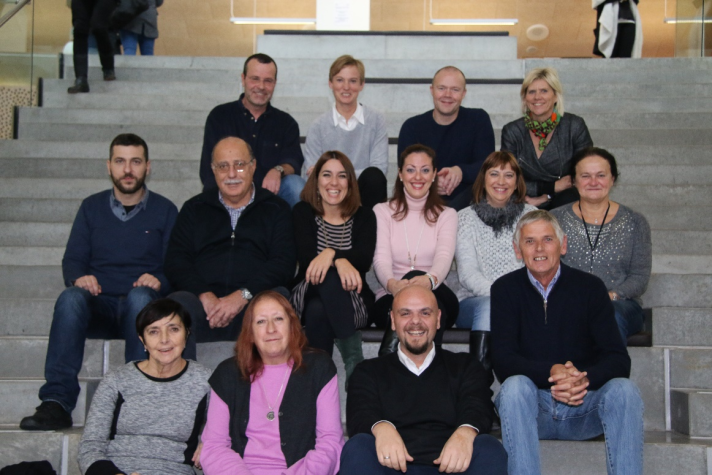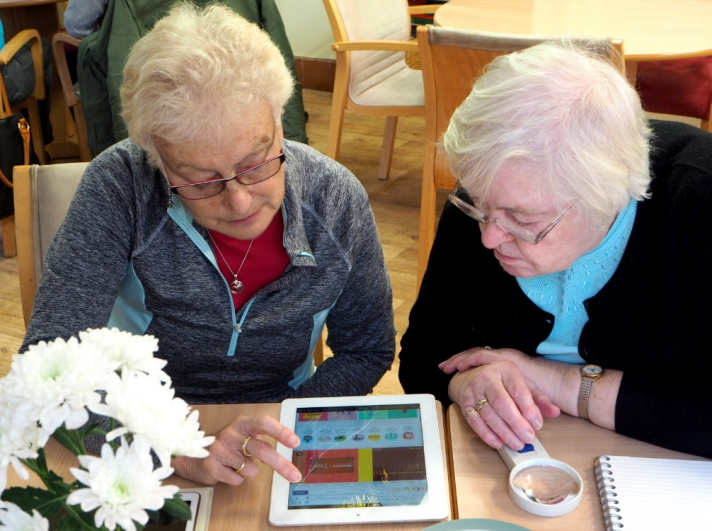Topic(s) addressed
The project’s primary objective was to develop a blended learning training programme that facilitated a more active lifestyle among the elderly through the use of technology. Active living and active aging contribute to the everyday wellbeing of the elderly, with both considerations also supporting their rehabilitation and providing them with increased autonomy. In addition to facilitating their independence, the application of Information Technology potentially assists the elderly to participate in all aspects of community life. The programme developed and tested through this project enabled end-users (the elderly), to live a more autonomous life by capitalising on the many opportunities made available by technology – for example to order food and other goods online, access government services (which are becoming increasingly digitised), home banking, using telemedicine and teleassistance facilities, or when communicating with friends or family via e-mail, Skype, and social media networks.
Target groups
The project’s target groups consisted of VET teachers, the elderly, and, trainers and other personnel who were about to be trained for work with the elderly, with more than 2000 individuals who have either indirectly benefitted from the project, or who stand to benefit from it in the future.
Methodologies
An important element in the project’s overall methodology was national-level cooperation among individuals from working life and education, which was fortified through a number of meetings between both elements throughout the project’s duration. As a methodological consideration, each partner publicised the project internally and established local work teams in order to generate interest and knowledge on the project, and encourage the participation of internal staff from partner organisations. Aarhus Kommune was the largest participating organisation, with a number of efforts made to facilitate the exchange of experiences and networking opportunities with other municipal entities – both horizontally and vertically. One of the project’s methodological keystones was close cooperation with the target group (which included end-users and a number of external stakeholders), and their participation in the development of the training programme, both of which were important to the partnership in ensuring the programme’s relevance and future applicability.
Environments
To ensure the programme’s relevance, end-users were involved in the endeavour as co-developers, with the programme itself having been based on a research activity that was carried out at the beginning of the project period on existing training programmes. Moreover, interviews and focus groups had been carried out with target group representatives and external stakeholders from across all participating countries.
Teachers
Although the teachers and trainers of SOSU Østjylland were scholastically accomplished and competent in their line of work, they only had limited (or in some cases non-existent) contact with the end-users for whom they are training new carers. As such, the contact that had been established with end-user representatives through this project was certainly beneficial to the school’s staff, with Aarhus Kommune also having benefitted from their close cooperation with NGOs with regard to knowledge acquisition and cooperation on systematic work such as volunteering. SOSU Østjylland’s teachers were trained in the training of future care workers so that the latter, in turn, may assist the elderly in utilising new technology – thus increasing their independence. Moreover, future care workers were directly involved in the training of the elderly so as to provide them with a realistic understanding of the challenges that care workers face in carrying out their everyday tasks with the elderly. Lastly, future care workers were involved with the design of the curriculum so they may also be coached on new approaches and required skills for the teaching of new technologies to the elderly.
Impact
The project’s main achievement was a training programme for the elderly, which may be used by teachers and trainee teachers in care education, volunteers and their organisations, as well as by end-users, peer-to-peer users, and/or individual users. It should be noted that the project’s achievements in Greece far exceeded expectations, and the country boasted the highest number of participants for the project’s training courses, with 58 actual participants against the anticipated 30. Greece also had a higher number of trainers trained, with 7 actual trainees as opposed to the anticipated 5; additionally, trainee satisfaction levels were exceptionally high in Greece. Similarly, dissemination levels were remarkably high for the country, with a significant number of
participants in the multiplier event, and a large quantity of newspaper articles, interviews on regional TV stations, presentations, seminars, and conferences. In sum, the TECHSenior project was exceptionally successful in Greece. This was also the case in Spain; CDEA’s contact with SECOT and its participation in the ‘Train the Trainers’ course as educators resulted in increased interest and expectations for the TECHSenior project, with CDEA having also been invited to participate in a course on new technologies for senior citizens (from 2018-2019) that was sponsored by Vodafone. Although unforeseen, ERROTU’s participation as a trainer in the Train the Trainers’ pilot course had allowed it to expand its links with the CDEA, and establish new contacts with SECOT, Mondragón University, and several other organisations. Multiplier events that were held in the UK also attracted more interest than expected, with groups of attendees staying behind following the event’s completion in order to discuss raised issues, personal reflections on future strategies, and the sustainability of the project itself. Despite the project’s success, not all participants were prepared to sign the participants’ list, and (as reported by the British partner) several participants were quite wary about providing their details. Nevertheless, the total number of signatories was 23, which exceeded the anticipated figure of 22, as predicted in the application. The teacher training session in the UK was particularly well received, with many more individuals than anticipated showing interest in the programme – particularly in the teaching of the elderly, and its associated pace, methods, and various other considerations. Given that SOSU Østjylland educates and trains staff for Aarhus Kommune, the project provided the school with the opportunity to establish new links (and strengthen existing ones), while facilitating the exchange of new views and experiences between both organisations. Furthermore, topics that had been discussed in the meetings extended far beyond those of IT and the elderly, with long-lasting connections established among participating institutions. As a result of their work with senior citizen NGOs, a close (albeit unexpected) relationship was established between the school and Ældresagen (DanAge). Furthermore, the two largest and most influential senior citizen NGOs, Ældresagen and Danske Seniorer, not only provided invaluable feedback during the development of training materials, but also shared their vast knowledge base on the needs of the project’s end-users, with several of their trainers having participated in the programme’s training of other trainees. Establishing such cooperative relationships with senior citizen NGOs was vital to SOSU Østjylland, as it brought the school into closer contact with the project’s target group – individuals who will go on to work in Denmark’s care sector. Moreover, the smaller Syddjurs Kommune was also involved in the project so the school could ensure that its material not only catered to the needs of the elderly in large municipalities such as Aarhus, but that they also met the needs of senior citizens living in smaller rural municipalities. To this end, volunteers from Syddjurs were both trained and involved in the training of the elderly. Lastly, a number of NGOs working with migrants were also involved in the project so the school could be better informed on how to reach out to the said group.
- Reference
- 2016-1-DK01-KA202-022334
- Project locations
- Denmark
- Project category
- VET schools
- Project year
- 2021
Stakeholders
Participants
Aarhus Kommune
- Address
- Denmark
Koinonikos Synetairismos Periorismenis Efthinis To.Ps.Y. N.Axaias FAROS
- Address
- Greece
C.M. SKOULIDI & SIA E.E.
- Address
- Greece
Centro De Formacion De Administracion Y Hosteleria Sl
- Address
- Spain
Errotu Taldea S.L.P
- Address
- Spain
European Forum for Vocational Education and Training
- Address
- Belgium
Age UK Bath and North East Somerset
- Address
- United Kingdom


